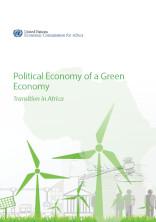Political economy of a green economy transition in Africa

The United Nations Conference on Sustainable Development (Rio+20) identified the green economy as one of several approaches to sustainable development, and in particular, that the green economy should “contribute to eradicating poverty, as well as sustained economic growth, enhancing social inclusion, improving human welfare, and creating opportunities for employment and decent work for all, while maintaining the healthy functioning of the Earth’s ecosystem” (United Nations, 2012, para. 56). In their common position to Rio+20, African countries recognized that the transition to a green economy could offer new opportunities to advance the achievement of sustainable development and underlined the need for the green economy to be rooted in national priorities.
Since the Rio+20, several African countries have adopted green-growth strategies and are pursuing green growth in selected sectors (ECA, 2013a, p. 13). As of June 2015, several countries had or were in the process of developing green economy strategies or action plans at the national level. These include Ethiopia, Kenya, Mozambique, Rwanda, Senegal, South Africa and Tunisia. Several countries have also succeeded in making green economy an integral part of national development planning. In Kenya, for example, the Green Economy Strategy and Implementation Plan has now become part of the medium-term plan for 2013-2017. This is based on the understanding that for a successful green economy transition, national development planning processes should be reframed in the context of green economy. The main priority for most countries is inclusive growth and making economic growth more responsive to poverty eradication. Others have called for social impacts and inclusiveness to go beyond creating green jobs, in favour of wider social protection for those who will be negatively affected by the green economy.